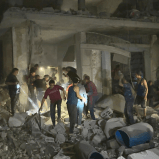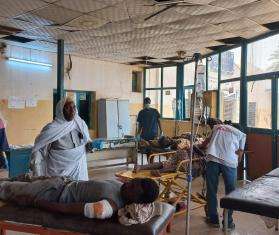By Isabelle Defourny, President, MSF France, and Christopher Lockyear, MSF Secretary General
We have visited Gaza at different moments since the escalation of war in October 2023. The suffering we witnessed there is beyond imagination—including in areas Israel has unilaterally declared as “humanitarian zones” while regularly attacking them. Yet our colleagues told us the situation is even worse in northern Gaza, a region we could not access. Recently, the situation there has become a nightmare.
For weeks now, people in the northern Gaza cities of Beit Hanoun, Jabalia, and Beit Lahia have been facing one of the most vicious and violent attacks since the beginning of the war. The area is being heavily bombarded by Israeli forces, who once again choose to indiscriminately attack entire areas, thereby accepting massive civilian casualties. At the same time, Israeli forces issue evacuation orders that cannot be obeyed. Many of the people who try to leave are reportedly subjected to arbitrary detention, while others are shot at and bombed as they flee. Last month in Jabalia refugee camp, evacuation orders were issued 48 hours after the start of a military operation, which shows that Israeli forces had no intention to spare civilians, and that these warnings are merely cosmetic.

What’s happening in northern Gaza?
Read moreUntil recently, several of our own colleagues and their family members were still trapped in northern Gaza and were witnessing this inhumanity firsthand. Two of our staff are still there, unable to flee. They are terrified and afraid for their lives, and with good reason: on October 8, our colleague Nasser Hamdi Abdelatif Al Shalfouh was hit by shrapnel during attacks in Jabalia; he died two days later from the injuries to his legs and chest, and because he was unable to receive the necessary level of care at an overcrowded hospital. On October 14, an MSF physiotherapist and his son were injured by shrapnel. On October 24, an Israeli attack on a building in Khan Younis, in southern Gaza, killed Hasan Suboh, another MSF staff member. Nasser and Hasan are the seventh and eighth MSF colleagues killed in Gaza since October 7, 2023.
After two weeks of complete siege, Israeli forces are now allowing some trucks to move humanitarian supplies within northern Gaza. But they are still preventing enough aid from reaching the area to meet the massive needs, effectively cutting off lifelines for thousands of people. Since last October, the level of aid allowed in north Gaza, as well as the whole Strip, has never been so low.
Hospitals are ordered to evacuate or directly attacked. In early October, Israeli forces besieged the three main hospitals in northern Gaza—Indonesian, Al-Awda, and Kamal Adwan—while hundreds of patients were reported to be inside.

On October 22, one of our medical staff, who found shelter inside the besieged Kamal Adwan hospital, described the situation inside as disastrous. He noted an overwhelming number of patients and a critical lack of medical supplies or equipment to treat them. This was before the hospital was attacked and stormed by Israeli forces from October 25 to 28, then repeatedly bombed—including its supplies of medications—over the last weeks.
In northern Gaza, medical infrastructure has been dismantled or rendered only partially functional. This leaves hospitals unable to treat the injured, especially critically injured patients who are therefore effectively condemned to death. During our visits we heard harrowing stories of patients dying due to lack of electricity. During the last weeks of October and the first week of November, the number of medical consultations at the MSF clinic in Gaza City has more than doubled, linked to the arrival of people displaced from northern Gaza.
While the attacks on northern Gaza look particularly ruthless, they appear to be the logical continuation of the strategy adopted so far by Israeli forces in Gaza. Since the start of this chapter of the war a year ago, in response to the brutal massacre carried out by Hamas in Israel on October 7, 2023, we have watched in horror as Israeli forces launched an indiscriminate bombing campaign. This campaign has been waged while issuing evacuation orders built on the lie of the existence of “safe zones” where civilians could seek shelter from the violence. The reality is that there is no safe place in Gaza.
Throughout Israel’s campaign of death and destruction, a clear pattern of unimaginable violence has emerged. Again and again, people in Gaza are forced to make the impossible choice between staying, in defiance of evacuation orders, being considered as legitimate targets, and risk being killed; or leaving and risking their lives in transit or at their destination. At the same time, there is no hope for them to reach a truly safe place outside the Strip, as all Gaza crossing points have been closed since May 2024. MSF has repeatedly called for the reopening of these crossing points, along with guarantees that Palestinians have the right to return to Gaza.
Over the past month, there have been intense conversations in Gaza about the so-called “Generals’ Plan” or “Eiland Plan” proposed by members of the Israeli security establishment. This is a plan which consists of wiping Palestinians off the map of northern Gaza by either killing them, forcing them out, or starving to death those who stay. Israeli officials have denied that they are implementing the plan. However, the way the ongoing offensive in the north is being waged and the dehumanizing language that Israeli authorities have been using towards Palestinians indicate that we are witnessing the execution of this plan.
Atrocity is piling on to atrocity at a level unlike anything we have seen over our working experience with MSF in some of the most acute humanitarian crises of the last decades. Israeli forces have killed over 43,900 people, including nearly 14,000 children, and injured more than 104,000 others, according to health authorities in Gaza. Our medical teams have witnessed first-hand the horrors of this relentless bombing campaign: children with burns across their whole bodies and faces, many with crushed limbs after being buried under the rubble for hours; others who had to face amputations without anesthesia; and body after body being brought to our medical facilities.
Israeli forces have failed repeatedly and consistently to spare the people of Gaza and have continued their annihilation of the Strip, making it uninhabitable. During our visits, even though we expected the worst, we were still shocked by the magnitude of destruction: homes, hospitals, water and electrical systems, schools, universities, mosques, churches, public archives, historical sites—all levelled. More than 66 percent of all buildings in Gaza have been damaged, according to the United Nations. Some of our 800 colleagues in Gaza told us how the Israeli offensive has destroyed the social fabric, their hopes for the future, and even their memories of the past. Keepsakes, photographs, and other links with their history have been destroyed. All the elements of a society have been destroyed.
In January 2024, the International Court of Justice ordered Israel to take all measures within its power to prevent genocide against Palestinians in Gaza and enable the provision of basic services and humanitarian assistance. Ten months later, we can see that no tangible effort has been made to prevent a genocide. On the contrary, Israeli forces continue killing scores of Palestinian people, inflicting massive harm on people’s physical and mental health, attacking hospitals and other vital civilian infrastructure, and deliberately obstructing the delivery of lifesaving aid. The vote by the Israeli parliament, the Knesset, on October 28 to ban the UN Relief and Works Agency (UNRWA) is just the latest devastating blow to the capacity to provide relief to Palestinians. It's past time for Israel to stop flagrantly disregarding the ruling of the International Court of Justice. And it’s past time for Israel’s allies to end their support for this campaign of destruction of Palestinian life in Gaza.




